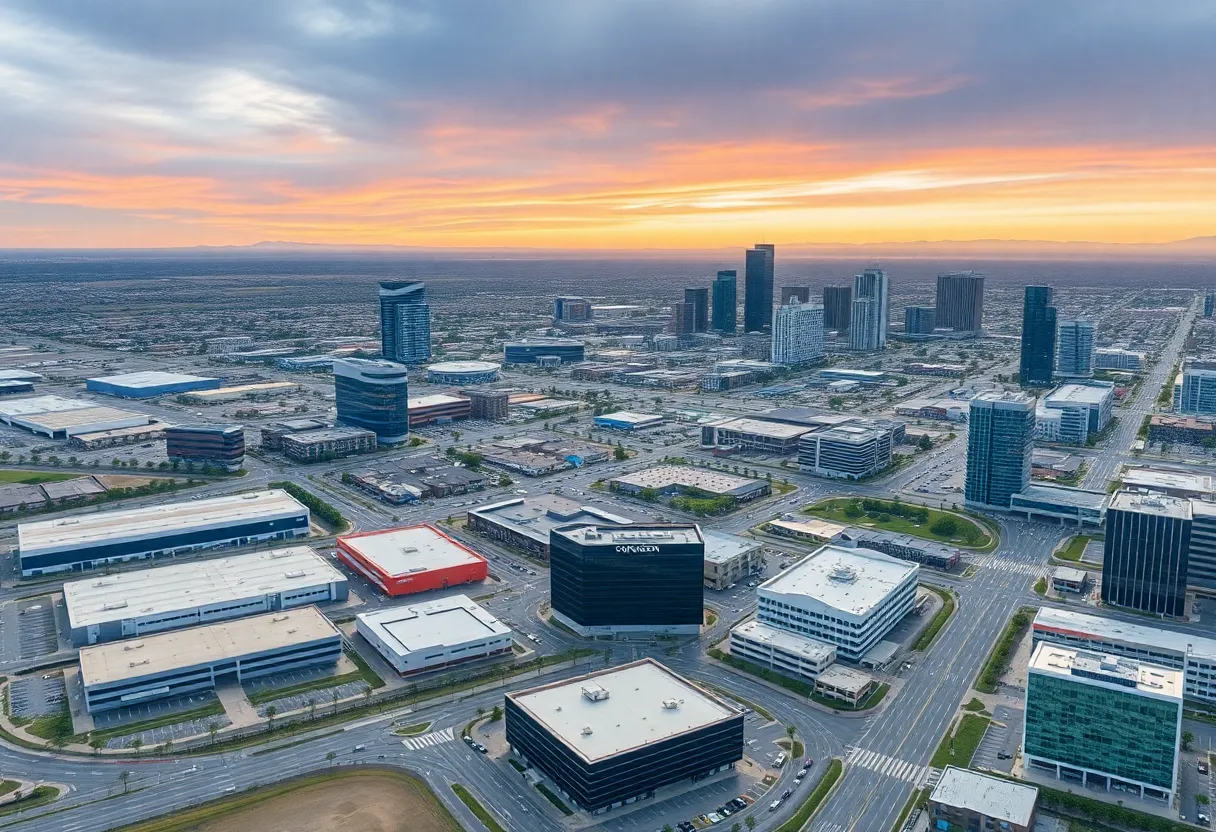News Summary
As Phoenix approaches 2025, its commercial real estate sector is experiencing significant shifts. While the office space market faces challenges with high vacancy rates, the industrial sector is thriving, driven by logistics and e-commerce demands. Despite concerns over rental payments, recent reports indicate stability across office and retail markets. Investors have shown renewed confidence with a considerable increase in property transactions. Stakeholders must navigate emerging trends and adapt to this evolving market landscape focused on industrial growth and cautious office leasing strategies.
Phoenix’s Commercial Real Estate Landscape Shifts as 2025 Approaches
The Phoenix commercial real estate market is undergoing significant transformations as it moves towards 2025, showing changing demand, complex leasing, and overall market uncertainty. Recent analyses indicate shifts in commercial activities, with renewed interest in the industrial sector while the office market continues to face challenges.
As of late 2024, the focus is on the monitoring of lease and loan defaults. Although concerns linger regarding tenant rent payments, reports indicate that significant default numbers have not been observed. Stability in both the office and retail sectors has been noted, yet stakeholders remain vigilant, ensuring that tenants maintain their financial obligations. The situation underlines the market’s cautious optimism as property owners and managers navigate the changing landscape.
Shifts in Office Space Demand
The office real estate sector illustrates a mixed picture. While many companies are encouraging employees to return to physical office spaces, downsizing has become a common approach. Businesses are increasingly adopting conservative strategies when seeking new office space, focusing on optimizing their real estate footprint to align with changing operational needs. Consequently, high vacancy rates persist in the office market as organizations adapt to the post-pandemic environment.
Industrial Sector Maintains Strength
In stark contrast, the industrial sector displays resilience and growth, particularly driven by logistics and e-commerce businesses. A notable uptick in the development of higher-end industrial parks and warehouses that cater specifically to e-commerce has been observed. This trend reflects the ongoing evolution of consumer behavior and supply chain requirements, which are favoring modern facilities tailored for swift distribution capabilities.
Stability within the industrial real estate market emerged in the final quarter of 2024, even amidst a slowdown in development pipelines across most markets. By December 2024, the national industrial vacancy rate had risen to 8%, a noticeable increase from below 4% in 2022. Particularly in key U.S. industrial markets like Phoenix, Orange County, and the Inland Empire, the demand remains consistent, solidifying their positions as dominant players in the sector.
Robust Recovery in Investment Market
The Phoenix commercial real estate investment market demonstrated a strong rebound in 2024, with a remarkable $11.8 billion in property transactions, representing a 32% increase from the previous year. This revitalization of the market indicates a renewed confidence among investors and developers, as they navigate the complexities of the current economic landscape while seeking opportunities for growth.
Conclusion and Market Outlook
As the dynamics within Phoenix’s commercial real estate market continue to evolve, stakeholders will need to stay informed about emerging trends that could impact future developments. The increasing focus on the industrial sector, coupled with the cautious approach to office space leasing, highlights the need for adaptability in navigating the changing demands of the marketplace. The attention to potential lease and loan defaults further underscores the importance of strategic planning in this fluctuating economic environment.
Looking ahead, the expectation of continued growth in the industrial real estate sector remains strong, particularly with logistics and e-commerce playing pivotal roles in shaping the future of commercial properties in Phoenix and beyond. Stakeholders in the real estate market will need to remain agile to seize emerging opportunities while addressing potential challenges.
Deeper Dive: News & Info About This Topic
HERE Resources
Arizona’s Economic Growth: A Bright Future Ahead
Tidewalk Partners Wins REIAC/Rockefeller Group Challenge
TOBY Inc. Joins Mayo Clinic and ASU MedTech Accelerator
Mortenson Co. Acquires 217 Acres in Northeast Phoenix
Avnet Inc. Acquires New Global Headquarters in Tempe
Governor Hobbs Vetoes Bill to Limit Chinese Land Purchases
Arizona Tops Nation in Per-Capita Commercial Construction Spending
Phoenix Office Market Faces Challenges Amid Lease Cancellations
Phoenix Downtown Construction Boom with 5,200 New Units
Arizona Real Estate Market Sees Growth Amid Price Corrections
Additional Resources
- AZ Big Media: 5 Real Estate Law Trends to Watch in Arizona
- Colliers: Greater Phoenix Office Market Report Q1 2025
- World Property Journal: 2024 Industrial Real Estate Report
- Google Search: Phoenix Commercial Real Estate
- Wikipedia: Real Estate

Author: STAFF HERE PHOENIX WRITER
The PHOENIX STAFF WRITER represents the experienced team at HEREPhoenix.com, your go-to source for actionable local news and information in Phoenix, Maricopa County, and beyond. Specializing in "news you can use," we cover essential topics like product reviews for personal and business needs, local business directories, politics, real estate trends, neighborhood insights, and state news affecting the area—with deep expertise drawn from years of dedicated reporting and strong community input, including local press releases and business updates. We deliver top reporting on high-value events such as the Waste Management Phoenix Open, Cactus League Spring Training, and Arizona State Fair. Our coverage extends to key organizations like the Greater Phoenix Chamber of Commerce and Visit Phoenix, plus leading businesses in technology and healthcare that power the local economy such as Intel and Banner Health. As part of the broader HERE network, including HERETucson.com, we provide comprehensive, credible insights into Arizona's dynamic landscape.





